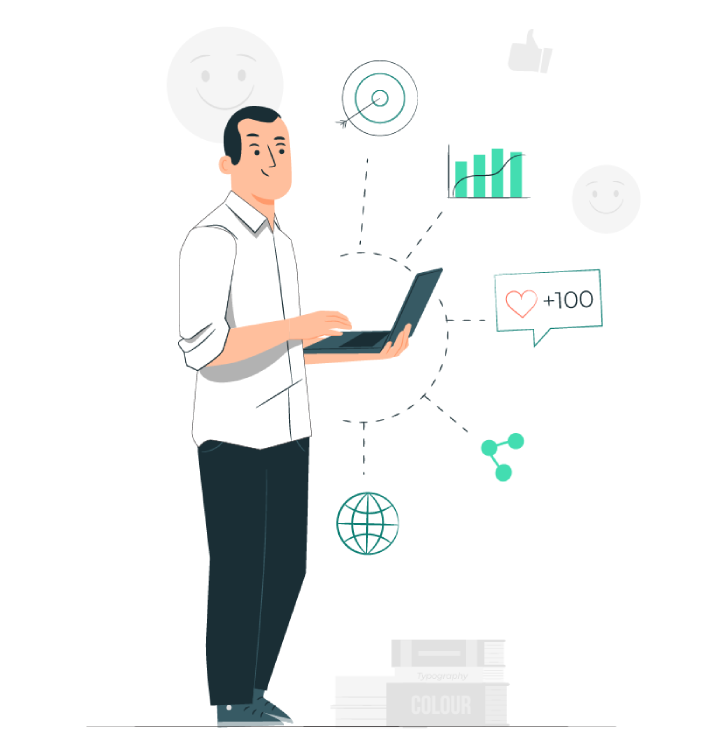Lead Generation
A lead, sometimes known as a “prospect,” is a possible customer who has been contacted in a sales setting. The definition of “lead” may change depending on the business. Some businesses define a “lead” as a contact that has already been identified as a potential customer, while other companies define a “lead” as any sales contact. All definitions agree that a lead’s goal is to develop into a future paying customer.
For your business, you need a solid lead generation plan. You may better target your market, expand your company, and increase sales with its assistance. Lead generation brings visitors to your website, where you may turn them into paying customers. People and companies may now connect much more quickly, thanks to Google. It also enables you to target a consumer audience actively using a search engine to look for your good or service. Through various lead generation techniques, you may entice potential clients to interact with your company, which, if adequately supported, can result in sales. The more individuals discover your company through any marketing strategy and express interest, the more revenue this generates for your company.
- Prioritize the features your customers need
- Align everyone around the roadmap
- Define your product vision with customer feedback


A lead generation funnel: What is it? & Why do you need it?
A lead generation funnel is a process for determining who is at which step of the purchasing process. There is a method to lead generation. A lead funnel is a systematic way to guide your target market through several phases so that, ideally, they will purchase from you. For instance, your website, blog, social media post, or advertisement may attract potential consumers. Your first engagement is here. They may then continue their adventure by liking the content or subscribing to your blog. A sale and a fully paid consumer are the desired outcomes. A lead generation funnel can help in this situation.
In essence, a lead generation funnel is a terrific tool for determining where in your company’s customer base potential clients are. As a result, you are concentrating on what stage of the purchasing process they are in. Your sales or marketing team will know where to direct their attention next if they are aware of the stage they are in.
The advantages of constructing one are numerous. It first aids in spreading awareness of your brand. Second, you may gather vital data on the customer. It’s often less expensive than most commercials. It often helps both the buyer and the seller, as well. For a sales lead, you are providing something in return.
B2B Lead Generation
B2C Lead Generation
Difference between B2B and B2C lead generation
B2B Lead Generation
B2B lead generation is the process of spotting and arousing the attention of new clients in marketing. Or, to put it other way, it’s the prerequisite for any business before closing a deal. Finding businesses that could be interested in the goods or services your company is selling is one way to identify new clients (your target audience). By gathering their contact information and adding it to your sales funnel, you may start to spark interest. After that, a sale can turn a lead into a client.
Sales qualified leads (SQL) are defined differently in B2B organisations since they rely on the industry or market segment in which the company operates.
Although lead generation typically falls under the category of advertising, it is not restricted to paid channels and strategies. Lead generation may refer to any online or offline method that increases interest in your website or business. Event marketing, social media, email marketing, pay-per-click advertising, cold calling, and content marketing are among the most often employed methods. A well-designed website that is fully optimised, focused on creating interest in your services, and adequately streamlined is one of the most crucial components of contemporary B2B lead generation marketing.
B2C Lead Generation
Business to consumer, or “B2C,” refers to direct sales between a company and a person, usually referred to as a consumer. It applies to all forms of direct marketing to consumers. For instance, this may apply to products, services, plans, or agreements. Generally speaking, any company-to-consumer transactions. Even though it applies to all forms of direct selling, e-commerce—also known as online selling—is where it is most frequently connected. Traditional high-street companies face difficulties due to the increase in internet sales. They also need to develop an online service in order to remain competitive.
Generally, every company conducting direct client sales needs a web presence. This can only be advantageous for the consumer. The benefits of shopping online are enhanced by the constantly expanding market of products available. In essence, you need to be aware of and on top of your business-to-consumer marketing if you operate a business and are selling products or services.
Difference between B2B and B2C lead generation
B2B sales include a decision-making process that requires many parties’ approval. It’s a lot more complicated. Decisions must be considered carefully because they affect the experience of all users. For instance, before determining which piece of software has the most advanced features at the best price, a digital website and marketing business would first evaluate and contrast several various types of software.
Another example is a website that sells office furniture. Other firms that require office furnishings are its primary target market. Or a wholesaler supplying food to eateries like cafés. Instead of selling to customers directly, these businesses sell to other businesses.
B2C selling, in contrast, doesn’t require a consensus. Selling directly to the customer is the goal. This definition should assist you in focusing on your B2C sales and determining the best course of action.
However, it should be noted that certain businesses can conduct both B2B and B2C operations. An example is an organisation that manages events. They may provide wedding planning services as well as conference management services to other companies. They may interact directly with audio and visual companies while selling concert tickets.
How can Virtual Pebbles help you?
The Virtual Pebbles team is aware of the importance of quantity and quality in developing B2B, and B2C leads. In addition to assuring a greater conversion rate overall, you will spend less time nurturing and following up on ineffective prospects with our help. Because of the quality of the services we offer, our clients choose us. Additionally, they decided on Virtual Pebbles because we tailored our services to meet their particular needs. We recognise that every company and brand is different, and we’re excited to work with you to determine what you need to flourish online.
We provide high-calibre, dependable, and customised services. The best part is that Virtual Pebbles is always there for you. You may check in with us and see the progress of your investment in real-time.